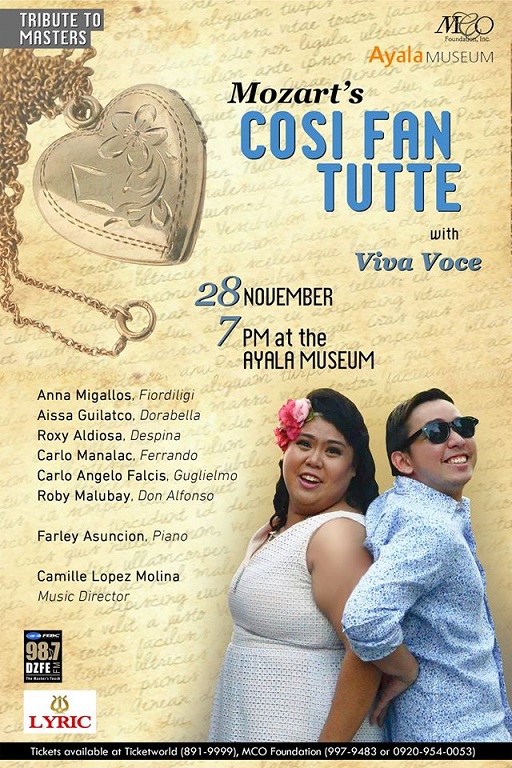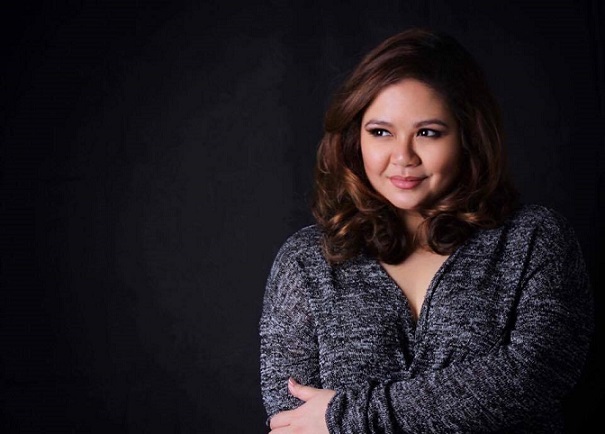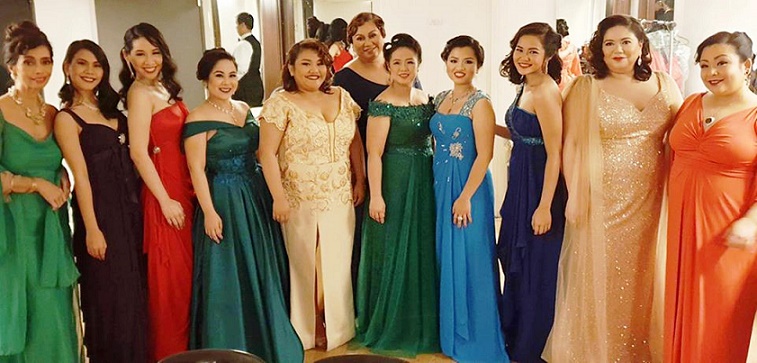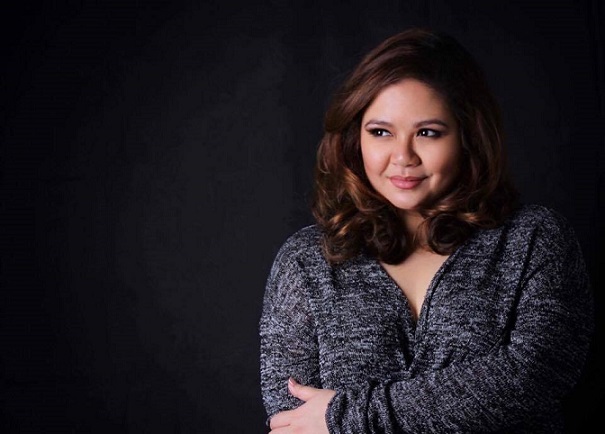
By PABLO A. TARIMAN
SOPRANO Anna Migallos is a millennial who loves thrillers like the “Millennium Trilogy” by Stieg Larsson but is just too human not to like drama like Anne Rice’s “Cry to Heaven.”
But she can very well connect with Mozart’s “Cosi fan tutte” first performed in 1790 at the Burgtheater in Vienna.
A product of the Royal College of Music in London, Migallos admits she loves opera even as she admits a special fondness for Beyoncé who to her is life itself.
She points out: “Opera is timeless. It’s centuries old, yes, but it doesn’t deserve to be in a museum. For one, the themes are just as relevant and poignant now as they were then.”
For her, classical music is not just an education but a way of life that is far better than millennials would care to admit. “These days we’re all about shortcuts and quick payoffs. But there are no shortcuts to classical music and singing opera. You put in the hours, the sweat, blood, and tears. The frazzled nerves, the disappointment.”
Singing the role of Fiordiligi in the Mozart opera, the soprano is in the thick of preparations for the part. “Yes, it’s my first time to sing the role. I understudied it in London, but never had the chance to actually perform it. I like to listen to Carol Vaness as Fiordiligi. I think often times, singers tend to be precious with Mozart and try to make it sound very delicate and light. Vaness doesn’t do that. She’s not precious about it. I also like the 2006 Cosi fan tutte of Glyndebourne. It’s fun to watch – very fresh, and young.”
She points out the vocal challenges of singing Mozart compared to Puccini’s La Boheme which was the last production of Viva Voce of which she is a member. “Ideally you sing both Mozart and Puccini with the same voice. Just the style is different. Mozart is cleaner, whereas Puccini has a lot of portamenti which means you slide from note to note. But Mozart for some reason is harder, for me at least, because it’s so exposed and it calls for so much technical precision precisely because it’s so exposed. By exposed I mean the orchestra is not as thick and heavy and therefore cannot hide technical flaws.”
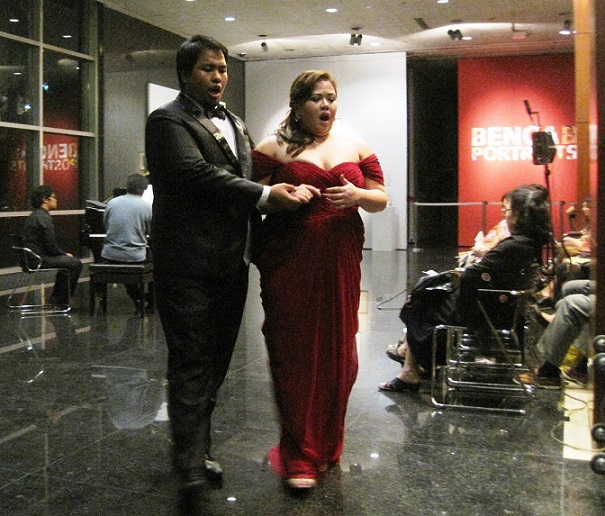
duet.Mozart for her is difficult compared to singing Puccini. Photo from brooksidebaby.blogspot.com
The soprano says she has to try harder to interpret the part because she has very little in common with the character who is torn between two lovers in the opera. “Truth be told, I can’t really relate to Fiordiligi. We have no obvious shared life experiences. I’m an only child, whereas she has a sister. My mom is always present. I don’t have anyone like Despina who tries to influence me to be naughty, unless you count my own conscience egging me on to have fun and break some rules. I’m currently single, and even when I wasn’t, no one else was trying to seduce me. Also, I’d like to think I’m fiercely loyal and incapable of betraying the man I love. So Fiordiligi is a bit of a challenge, I’d say. She’s fun though.”
The other singers in the Mozart opera are soprano Aissa Guilatco as Dorabella, tenor Carlo Manalac as Ferrando, baritone Carlo Falcis as Guilegno, mezzo soprano Roxy Aldiosa as the wacky Despina and bass baritone Roby Mahusay as Don Alfonso.
Like Migallos, they believe the opera is something both millennials and non-millennials can easily connect with.
Guilatco who sings the role of Dorabella says the unique music of opera and the language it uses may seem strange to some people but its story is full of character with concerns of the ordinary people. “For example, the opera explores the subject of love and its nature. What is love and how does one find out if it’s true or not? These are questions that millennials are constantly asking themselves.”
Production sources revealed the opera will be updated and will be given contemporary setting with characters in attire as they are seen today. “That should bring opera closer to home. On the other hand, singers have this artistic burden of understanding the music and the text so that they can impart the message of the music to the audience.”
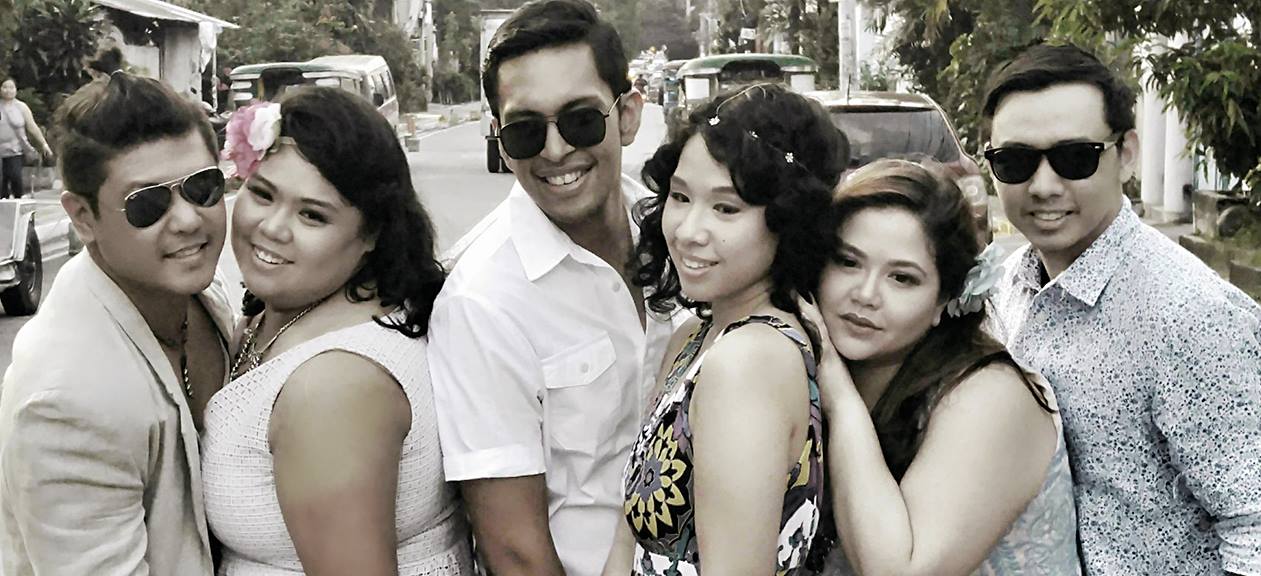
Malubay has sung the role of Don Alfonso four times in recital but it is the first time he will do it with recitative, complete arias and with added scenes to boot.
Between singing Puccini (Boheme) and Mozart, he can easily spot the difference. “For me, Mozart’s works are more playful that requires great stamina for singers. The playful music is not all the time about happiness because sometimes the lyrics or the meaning of the song is about sadness or anger. Unlike in Puccini’s work when you hear the music, you can instantly feel the mood of the scene.”
The baritone thinks millennials can easily connect to the Mozart opera. “The story happened many hundreds of years ago but you can see that it is still happening now. The young should give opera a chance.
They will discover they have a lot to learn from the past in reflecting on their present relationships.”
Adds Roxy Aldiosa, a millennial and who will sing the role of Despina: “I find opera to be an escape, much like a good book or film. With so many operas to choose from, there’s something for everyone. Comedy, drama, romance, fantasy, even horror. I think it’s a matter of making live opera a more accessible experience. Yes, there are tons of recordings and videos that I can recommend, but I think there’s a certain magic in hearing the full power of the human voice in a live performance.”
Directed by Camille Lopez Molina, “Cosi fan tutte” opens at Ayala Museum on November 28, 2016, 7:30 p.m.
(For tickets to the November 28 performance of Cosi fan tutte, please call Ticketworld at tel. no. 891-9999, MCOF, 997-9483, 782-7184 or cel. no. 0920-9540053 and 0918-347-3027. The opera production was made possible by Ayala Museum, Lyric Piano and DZFE. 98.7 The Master’s Touch.)
